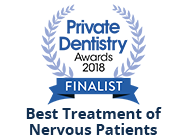How many times has an average dentist heard “I would rather give birth than go through dental treatment” or “I hate the dentist, nothing personal but I hate the dentist.”
Fear of visiting the dentist is very common. Almost half of adults in the UK have a fear of the dentist. And 12% of these suffer from extreme dental phobia, of which females predominate. Visiting the dentist is ranked number 1 for making people nervous, even more popular than fear of spiders or fear of heights.
Dental fear has various causes or trigger factors which vary in levels in different individuals. Some of the common causes are a previous bad experience as a child, fear of needles, fear of pain, fear of choking, fear of being embarrassed, or fear of being out of control of the situation or fear of finding out what is unsatisfactory in one’s dental health.
What is the implication of dental fear?
The greatest implication is for patients to completely avoid going to the dentist unless there is a pressing need to do so like a raging toothache, or facial swelling or a broken front tooth. 27% of people only visit their dentist when they have a problem.
The lack of visiting the dentist on a regular basis causes small dental issues to progress without being addressed to lead to larger dental issues which can be more painful, sometimes irrevocable and lead to expensive treatments. The secret to a great, long lasting dentition lies in regular visits to the dentist and the Dental Hygienist.
What can we do to help?
Here at Aspects Dental we recognise how common dental fear is. We aim to reassure all our patients, that no dental fear is small and will assist our patients to overcome their fear, we encourage them to go through the treatments in small increments and eventually reach their desired smile they have always wanted. We aim at making each dental visit to be a positive experience, bringing you closer to combat the dental fear itself.
There are many techniques that we use to help the patient feel at ease. Some of which include, a thorough explanation of the diagnosis using photos and x-rays, going through various treatment options and associated pros and cons and going through the procedure in detail so patients are fully aware of what will happen during the course of the treatment.
We also allocate more time when treating nervous patients to make sure that they are comfortable throughout and treatment is at a suitable pace for them and it is not rushed. Other ways that work well to distract patients is to listen to music during treatment, watching TV programmes, bringing a friend along, agreeing on a stop signal with the dentist.















